
Summer is for letting your hair down and water pistols. But in an age where we're super-soaked with content online, how did a couple of nuns in Brazil emerge through the saturation? As Sister Marizele sang and beatboxed, Sister Marisa danced on a Brazilian Catholic television show. They've now recorded their song, 'Vocation'.
Even though their online content was more about vocation than vacation, it's attracted huge numbers. “Why did something so simple and spontaneous take on such a huge scale?” asked Sister Marizele, “Because the Holy Spirit wants to touch people’s hearts.” “But besides the Holy Spirit,” she told the New York Times, “there’s also the algorithm.”
The algorithm's clearly helped. One of the nuns' colleagues came back from vacation to keep the content going online. Instead of only a handful of prospective nuns per year, they had over 50 women get in touch in a matter of days to ask about embarking on the life of a nun ahead. The nuns believe that God wants to draw young people to church in a country where church attendance has dropped off a cliff. Perhaps they should seek advice from Whoopi Goldberg, who has given them her blessing as a 'real-life ‘Sister Act’.
They aren't the only ones. Father David Michael is an American Catholic priest on Instagram (sometimes breakdancing) with 1.2 million followers who combines an uncompromising message with a sophisticated understanding of the need to hook people in the first three seconds of a video. This all doesn't paint the the staid picture of the church we expect. The iconoclastic act of beatboxing on TV isn't just breaking down beats, but the image of religion as being fun-averse.
Perhaps there's more to fun than meets the eye. We might misconceive fun as shallow, frivolous and lacking in depth. But you can be both a nun, and fun. Maybe it's not just a case of unexpected possibility, but actually intrinsic to those with vocations in faith.
Yesterday I returned from a crematorium in the front passenger seat of the empty hearse. The driver, along with hilarious stories of funerals gone wrong, also told me about losing his own child ten years ago. 'They say time's a great healer. But it isn't. You don't get over it. You learn to cope with not getting over it.' Those who have suffered and still carry unimaginable pain can know what it is to laugh.
It's a similar depth of fun from the nuns that can speak into pain. Far from a gimmick, their skills haven't just been breaking down beats, but barriers. According to Sister Marizele, they've been "an instrument to become closer and break down barriers" with young women at drug and alcohol rehabilitation centres, where they otherwise had little to connect over.
It might seem an odd segue, but it's striking that Jesus' first miracle was turning water into wine at a wedding party. The sheer abundance of the wine signifies the abundance of what's possible when nuns lean into fun: restoration and community for addicts, purpose for people considering their calling, and – simply – joy. Joy for countless millions around the world watching on. Joy, as CS Lewis said, is the serious business of heaven.






